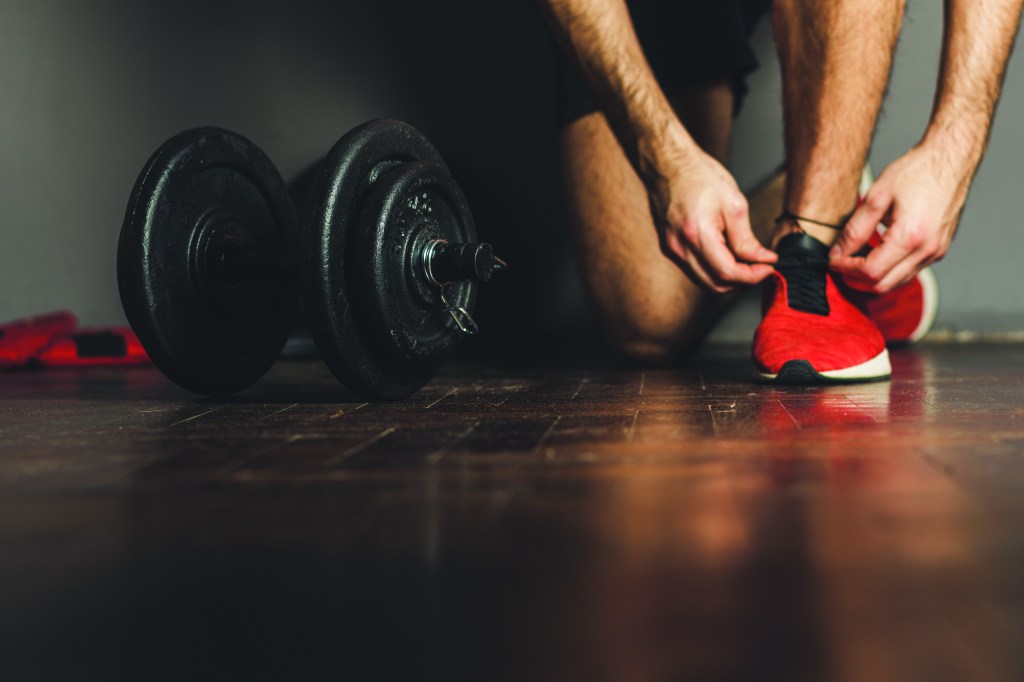Some of us are morning people; others are evening. But have you ever actually wondered about when the best time of day to exercise really is?
The best time of day to exercise is a topic often discussed and one that remains a subject of debate. When you exercise is also known as chronoactivity, and different research suggests the time of day best for optimal health benefits.
In this feature, we investigate whether it’s best for your body and mind to get up early and exercise, save working out for an afternoon break or get moving in the evening.
The best time of day
Contrary to what you might have been told, and sorry to disappoint you, there is no set time of day that is the best time to exercise. That said, numerous studies highlight the potential benefits of exercising at various times.
Dr. John Burke, Chief Medical Officer at AXA Health, agrees: “There is not one specific time of day that is proven to be the best time to exercise. It is more important to develop a pattern of consistency and regular exercise in order to maximise the health benefits.”
However, when you exercise is important because motivation and routine are essential to creating fitness habits. If you know you have more time and energy later in the day, then that might be your preferred time to fit in exercise and stick to it.
Ro Feilden-Cook, a mindset coach and Level 4 Personal Trainer, believes that each time of day has its unique benefits for exercising. “While morning workouts can boost your energy and clarity for the day, a lunchtime workout breaks up the working day,” she says. “And evening workouts align with peak strength and endurance.”
A morning mood-enhancer
Exercising in the morning is a great way to kick off the day and is often a time with fewer distractions. It gives you a sense of accomplishment and lifts your mood by releasing endorphins.
Exercise boosts the production of dopamine and serotonin, which can improve mood. Norepinephrine is another hormone enhanced by exercise, and it can help improve alertness and regulate blood flow.
While these changes can occur whatever time of day you exercise, releasing them in the morning may be more beneficial for the rest of your day.

The impact of hormones
Testosterone levels in the bloodstream of men tend to be at their highest point between 7:00 and 10:00 am. Therefore, men may benefit from exercising in the morning to take advantage of these higher levels.
“Elevated testosterone can enhance muscle growth, fat loss, strength training, and endurance,” says Dr. Burke.
Research also suggests that higher testosterone levels may provide a speed advantage when exercising.
A lunchtime boost
For some of us, lunchtime is the perfect opportunity to take a break and get moving. Men can especially benefit from this workout practice. A study of over 90,000 individuals found that those who did moderate to vigorous activity between midday and late afternoon had lower risks of early death or cardiovascular disease mortality.
PM peak levels
According to research, we burn 10 percent more calories later in the afternoon and early evening. So, if metabolism peaks in the afternoon, the heart, muscles, and nervous system are working at their peak and tend to be well-nourished. Therefore, your body may be at optimal physical levels in the afternoon.
Other research supports this, showing that under neutral climate conditions, short-duration maximal exercise performance is affected by the time of day, peaking between 4 pm and 8 pm. Further investigation revealed that men who exercised in the evening reduced their blood pressure and encouraged the breakdown of body fat.
Dr. Burke says: “Afternoon workouts can be beneficial in building muscle strength and endurance. Muscle function is typically higher in the afternoon and evening, making it an ideal time to target muscle growth.”

Temperature changes
Don’t overlook the impact of body temperature. Body temperature increases throughout the day and peaks between 2pm and 6pm. Higher temperatures can enhance muscle strength, enzyme activity, and endurance, which may positively impact physical performance and make it an effective time to work out.
Additionally, a higher body temperature may mean less risk of injury. Pulled muscles are a common injury and can occur if you’re not adequately warmed up.
That’s not to say you don’t need to warm up in the afternoon, but it may mean that the afternoon is a safer option for preventing injury.
Faster reaction times
Another factor that may influence when you exercise is reaction times. Research suggests that reaction time is quickest in the afternoon and evening.
This may have no bearing on your decision about when to exercise, but if you’re participating in HIIT or sports like tennis or football where reaction time matters, then it might be worth considering this window for exercise.
Exercise timing on sleep
Sleep is crucial for optimal performance and can be impacted by exercise in positive and negative ways. Some research suggests that morning exercise can help you sleep more soundly and for longer periods.
However, going for an intensive workout too close to bedtime may be counterproductive, so proceed with caution.
Howard LeWine, Editor-in-Chief of Harvard Men’s Health Watch, states on Harvard Health: “A small study, published in Sports Medicine, suggests that some people can exercise in the evening as long as they avoid vigorous activity for at least one hour before bedtime.”
Time of day and motivation
Morning workouts can help alleviate the struggle of fitting exercise into a busy schedule later on, potentially reducing stress and establishing healthy fitness habits.
One study found that morning exercise can encourage healthy choices throughout the day, and consistent morning exercise can increase the likelihood of maintaining the routine.
Feilden-Cook says that exercise creates energy rather than draining it. However, if time or motivation is an issue for you, start small, choosing a time of day that suits you. She says: “Small wins build momentum, making it easier to stay consistent and motivated.”
She adds that creating a sustainable fitness routine is all about finding a fitness formula that works with your life, not against it. “Ultimately, this approach will help you with consistency, and it is the consistency that leads to lasting results,” she says.







